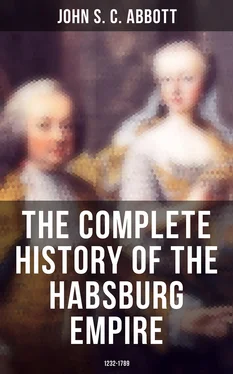With the usual display of semi-barbaric pomp, Albert made arrangements to leave his castle to engage in the perilous holy war against the Saracens, from which few ever returned. A few years were employed in the necessary preparations. At the sound of the bugle the portcullis was raised, the drawbridge spanned the moat, and Albert, at the head of thirty steel-clad warriors, with nodding plumes, and banners unfurled, emerged from the castle, and proceeded to the neighboring convent of Mari. His wife, Hedwige, and their three sons, Rhodolph, Albert and Hartman, accompanied him to the chapel where the ecclesiastics awaited his arrival. A multitude of vassals crowded around to witness the imposing ceremonies of the church, as the banners were blessed, and the knights, after having received the sacrament of the Lord's Supper, were commended to the protection of God. Albert felt the solemnity of the hour, and in solemn tones gave his farewell address to his children.
"My sons," said the steel-clad warrior, "cultivate truth and piety; give no ear to evil counselors, never engage in unnecessary war, but when you are involved in war be strong and brave. Love peace even better than your own personal interests. Remember that the counts of Hapsburg did not attain their heights of reputation and glory by fraud, insolence or selfishness, but by courage and devotion to the public weal. As long as you follow their footsteps, you will not only retain, but augment, the possessions and dignities of your illustrious ancestors."
The tears and sobs of his wife and family interrupted him while he uttered these parting words. The bugles then sounded. The knights mounted their horses; the clatter of hoofs was heard, and the glittering cavalcade soon disappeared in the forest. Albert had left his ancestral castle, never to return. He had but just arrived in Palestine, when he was taken sick at Askalon, and died in the year 1240.
Rhodolph, his eldest son, was twenty-two years of age at the time of his father's death. Frederic II., one of the most renowned monarchs of the middle ages, was then Emperor of that conglomeration of heterogeneous States called Germany. Each of these States had its own independent ruler and laws, but they were all held together by a common bond for mutual protection, and some one illustrious sovereign was chosen as Emperor of Germany, to preside over their common affairs. The Emperor of Germany, having influence over all these States, was consequently, in position, the great man of the age.
Albert, Count of Hapsburg, had been one of the favorite captains of Frederic II. in the numerous wars which desolated Europe in that dark age. He was often at court, and the emperor even condescended to present his son Rhodolph at the font for baptism. As the child grew, he was trained to all athletic feats, riding ungovernable horses, throwing the javelin, wrestling, running, and fencing. He early gave indications of surprising mental and bodily vigor, and, at an age when most lads are considered merely children, he accompanied his father to the camp and to the court. Upon the death of his father, Rhodolph inherited the ancestral castle, and the moderate possessions of a Swiss baron. He was surrounded by barons of far greater wealth and power than himself, and his proud spirit was roused, in disregard of his father's counsels, to aggrandize his fortunes by force of arms, the only way then by which wealth and power could be attained. He exhausted his revenues by maintaining a princely establishment, organized a well-selected band of his vassals into a military corps, which he drilled to a state of perfect discipline, and then commenced a series of incursions upon his neighbors. From some feeble barons he won territory, thus extending his domains; from others he extorted money, thus enabling him to reward his troops, and to add to their number by engaging fearless spirits in his service wherever he could find them.
In the year 1245, Rhodolph strengthened himself still more by an advantageous marriage with Gertrude, the beautiful daughter of the Count of Hohenberg. With his bride he received as her dowry the castle of Oeltingen, and very considerable territorial possessions. Thus in five years Rhodolph, by that species of robbery which was then called heroic adventure, and by a fortunate marriage, had more than doubled his hereditary inheritance. The charms of his bride, and the care of his estates seem for a few years to have arrested the progress of his ambition; for we can find no further notice of him among the ancient chronicles for eight years. But, with almost all men, love is an ephemeral passion, which is eventually vanquished by other powers of the soul. Ambition slumbered for a little time, but was soon roused anew, invigorated by repose.
In 1253 we find Rhodolph heading a foray of steel-clad knights, with their banded followers, in a midnight attack upon the city of Basle. They break over all the defenses, sweep all opposition before them, and in the fury of the fight, either by accident or as a necessity of war, sacrilegiously set fire to a nunnery. For this crime Rhodolph was excommunicated by the pope. Excommunication was then no farce. There were few who dared to serve a prince upon whom the denunciations of the Church had fallen. It was a stunning blow, from which few men could recover. Rhodolph, instead of sinking in despair, endeavored, by new acts of obedience and devotion to the Church, to obtain the revocation of the sentence.
In the region now called Prussia, there was then a barbaric pagan race, against whom the pope had published a crusade. Into this war the excommunicated Rhodolph plunged with all the impetuosity of his nature; he resolved to work out absolution, by converting, with all the potency of fire and sword, the barbarians to the Church. His penitence and zeal seem to have been accepted, for we soon find him on good terms again with the pope. He now sought to have a hand in every quarrel, far and near. Wherever the sounds of war are raised, the shout of Rhodolph is heard urging to the strife. In every hot and fiery foray, the steed of Rhodolph is rearing and plunging, and his saber strokes fall in ringing blows upon cuirass and helmet. He efficiently aided the city of Strasbourg in their war against their bishop, and received from them in gratitude extensive territories, while at the same time they reared a monument to his name, portions of which still exist. His younger brother died, leaving an only daughter, Anne, with a large inheritance. Rhodolph, as her guardian, came into possession of the counties of Kyburg, Lentzburg and Baden, and other scattered domains.
This rapidly-increasing wealth and power, did but increase his energy and his spirit of encroachment. And yet he adopted principles of honor which were far from common in that age of barbaric violence. He would never stoop to ordinary robbery, or harass peasants and helpless travelers, as was constantly done by the turbulent barons around him. His warfare was against the castle, never against the cottage. He met in arms the panoplied knight, never the timid and crouching peasant. He swept the roads of the banditti by which they were infested, and often espoused the cause of citizens and freemen against the turbulent barons and haughty prelates. He thus gained a wide-spread reputation for justice, as well as for prowess, and the name of Rhodolph of Hapsburg was ascending fast into renown. Every post of authority then required the agency of a military arm. The feeble cantons would seek the protection of a powerful chief; the citizens of a wealthy town, ever liable to be robbed by bishop or baron, looked around for some warrior who had invincible troops at his command for their protection. Thus Rhodolph of Hapsburg was chosen chief of the mountaineers of Uri, Schweitz and Underwalden; and all their trained bands were ready, when his bugle note echoed through their defiles, to follow him unquestioning, and to do his bidding. The citizens of Zurich chose Rhodolph of Hapsburg as their prefect or mayor; and whenever his banner was unfurled in their streets, all the troops of the city were at his command.
Читать дальше












